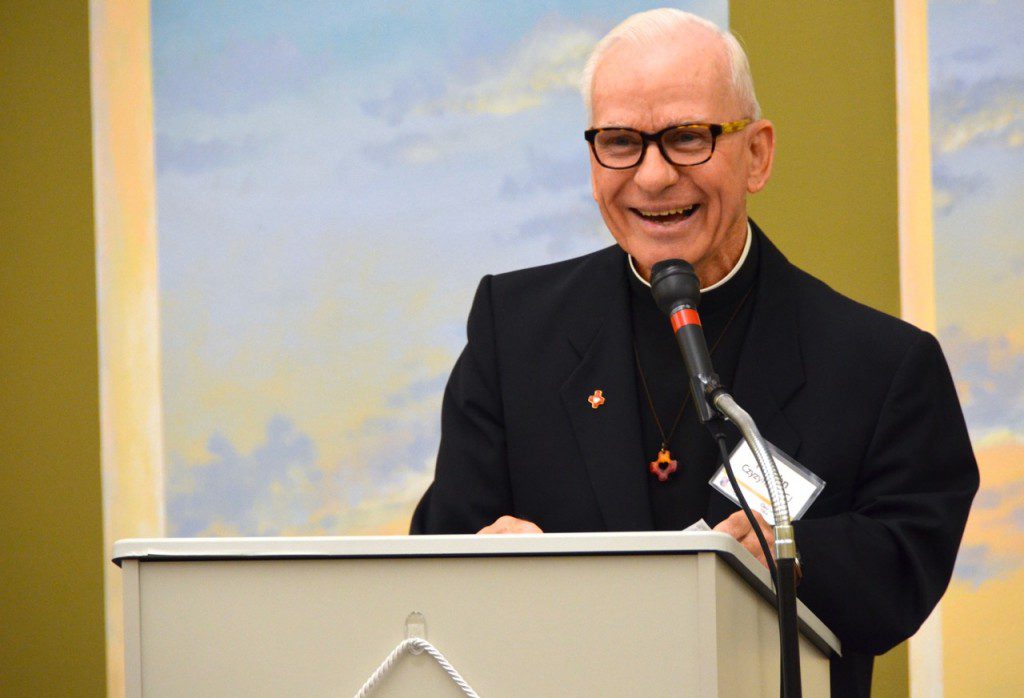
“My brothers, get to know the Shepherd, and share the One you have come to know and love with God’s People.”
-Fr. John Czyzynski, SCJ
On October 7th Fr. John Czyzynski, SCJ, was the presenter at this year’s Dehon Lecture hosted by Sacred Heart Seminary and School of Theology. His topic: “The Year of Consecrated Life; the dynamic interchange between the vocations of religious and diocesan priests as they advance the Church’s mission in the world.”
Below is an abbreviated version of his presentation. A link to a PDF of the entire text is provided at the end.
Responding to an invitation
In the invitation that I received from Monsignor Ross [SHSST president-rector] to be the presenter for the Dehon Lecture he wrote and I quote: “As it is the year for Consecrated Life, the topic we were considering was a reflection on the unique vocational calls of priests in consecrated life as well as diocesan priests — both of whom are formed here at SHSST for the priesthood — and the valuable synergy which is generated for the good of the Church’s mission from their common efforts.”
What works best for me is speak to you from the point of view of someone who has been involved for over 40 years in the formation of men preparing for ordination to the priesthood and/or profession of vows in a religious community.
Who am I? I left home to become a priest and along the way I grew into being a religious. Through the years of my formation with the Priests of the Sacred Heart –– the SCJs –– I came in touch with a group of men whose view of the Gospel and God gave expression to what I was coming to believe and value. So although I left home to be a priest, I now say I am a religious who serves as a priest.
Key statement
In October of 2011 the Conference of Major Superiors of Men issued a 22-page document dealing with the topic of formation of religious for priestly ministry. Near the end of that document there was a summary of what they wrote and in that summary there was one sentence which, in my estimation, was central to everything they wrote and which is central to everything that I am going to say. Here it is:
“Diocesan clergy have as their intended ministry assistance to the bishop as pastors of the people of God in a particular diocese; whereas religious clergy, although often enough they exercise ministry in a parish setting, have as their intended ministry the pastoral expression of the charism and mission of their institutes for the sake of the Church.”
Everything I want to share is somehow related to that key statement.
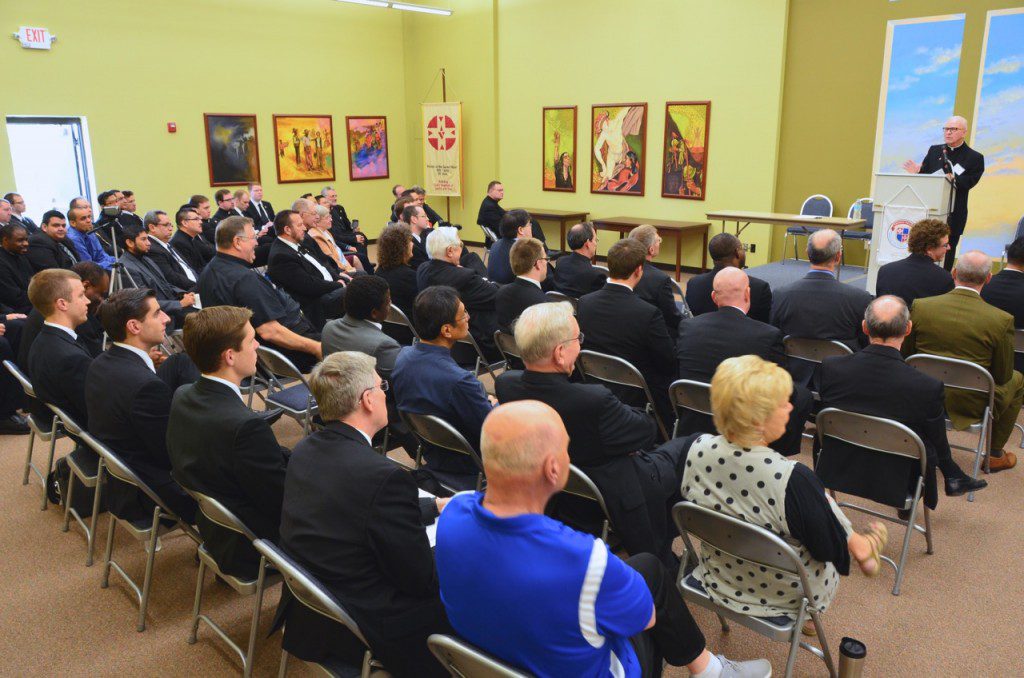
What does a diocesan priest look like?
Every diocesan priest is an extension of the bishop with his brothers in the local presbyterate. When a man is ordained by his local ordinary, the bishop takes his hands into his own hands and asks the man: “Do you promise obedience to me and my successors?” It is as if he is saying to that man: “God has entrusted the care of the people in this diocese to me. I cannot do this alone. Will you help me so together we can give these folks loving service? Will you make that commitment, please?”
As I reflected on how I might organize my thoughts about the ministry of a diocesan priest, I remembered something that I had read in Canon Law. Some of the most pastorally inspiring and challenging words about what is expected of a diocesan priest that I have ever reflected on are contained in Canons 528 and 529 of the 1983 revision of the Code of Canon Law. These particular numbers of the Code address specifically the duties of a pastor, but whether a diocesan priest has the title of “pastor” or not, he is always a shepherd for God’s People so what is contained in those numbers speaks to every diocesan priest.
The very first duty mentioned is that the Word of God is to be announced in its entirety to the people. My brothers, that is your first priority as a priest. We need to live and pray that word so that we can proclaim it the best we can. It is important to study the scriptures and consult homiletic aids and all those props that are available to us, but we especially need to absorb the word, integrate it, make it our own so that folks do not level against us a criticism I once heard of a priest: “he sounds like he is talking about something secondhand.”
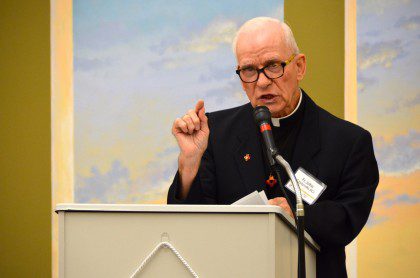
“God’s word must come from our hearts if it is going to touch the hearts of others.”
-Fr. John Czyzynski, SCJ
The next duty of the priest that the Code mentions is: “to foster works by which the spirit of the Gospel, including issues of social justice, is promoted…” Talking about issues of social justice in some parishes will not make you very popular. Those issues get at biases and prejudices in ourselves that we are often afraid to admit. They are such a part of the fiber of our being that we act upon them without even being consciously aware of them. So when we start to bring folks to an awareness of them, it is not comfortable. When I have to speak about such issues in a situation where I feel there may be great resistance, I make sure that I am speaking to myself as well as the rest of the congregation and not standing in judgment above or over them. Something I do that helps me with that is to give my prepared homily to God first. I speak to God about what I want to say to the folks and see if what I want to share is truly of God.
The Code goes on to say that the pastor is to take special care for the Catholic education of children and young adults.
I was touched by the Code’s call to “bring the gospel to those who have ceased practicing their religion or who do not profess the true faith.” We hear a similar call from our wonderful Pope Francis. He has told us to “get out of our sacristies,” to go to the folks, not to wait for them to come to us, but to follow the example of Jesus the Good Shepherd who seeks out the lost and puts His life on the line to get them back.
After indicating all those things I have just mentioned, the Code says: “see to it that the Most Holy Eucharist is the center of the parish assembly….” The Eucharist is like a many faceted jewel which has so many aspects to it. We Catholics believe in the abiding presence of Jesus among us in the Eucharist, but we can take that gift for granted. A friend of mine told me of an incident when a person who did not share our faith was being shown around the parish church. They paused before the tabernacle and the visitor said: “So you Catholics believe that Jesus is truly present here.” And the pastor said: “Yes, that is what we believe.” And the visitor said: “Then where is everybody???” We cannot spend our lives before the Blessed Sacrament, but do we appreciate the gift we have?
The Code calls us to a “devout celebration of …the Sacrament of Reconciliation.” Priests need to be aware of the power they have in this Sacrament. People come to us, vulnerable, frightened, overwhelmed. By the way we receive them we can give life or crush it.
The Code goes on to name groups of people who need our special attention: “have a generous love to help the sick, particularly those close to death…seek out the poor…those exiled from their own land… What special significance that has for us as we see what is happening in the lives of migrants and refugees in this country and throughout the world.
Ministry and prayer intimately connected
There was a time when priests believed that they had to have a spirituality that could be compared to the way we make use of gas stations. We run our cars till they need more fuel. We tank up and we are off till we need gas again. That concept, that way of living, influenced our way of operating in ministry so that priests would pour themselves into their ministry and then when they were exhausted and running on fumes, as it were, they would stagger back to a place of quiet and prayer and “tank up” so they could then go back “out there” to serve God’s people.
The second Vatican council adjusted that way of thinking and living. There are not two different aspects of the priest’s life that are running on separate parallel tracks, but rather they are intimately connected. The priest does not have to withdraw from his ministry to become holy. He is sanctified in the very actions of doing the holy things that are his life. Yes, we need to take time for prayer to deepen our relationship with God like any other believer, but God sanctifies us through the ministry we give and through the people with whom and to whom we render service.
Religious who are ordained
Now I want to share some thoughts about the ministry of religious who are priests. What is it specifically that priests who are religious are called to bring to their ministry?
The Conference of Major Superiors of Men stated that “religious clergy, although often enough… exercise ministry in a parish setting, have as their intended ministry the pastoral expression of the charism and mission of their institutes for the sake of the Church.”
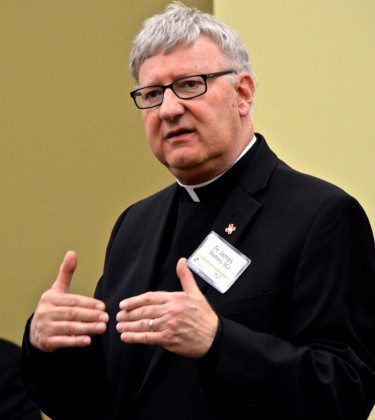
That is what the life and ministry of religious clergy is to be about. We are not substituting for the shortage of diocesan priests in parishes. Always, in whatever ministry we may be involved in, the ministry of religious clergy is about serving God’s people with the impetus we receive from the charism and spirituality of our particular religious communities.
To organize my thoughts about the ministry of diocesan priests I used the points made in the Code of Canon Law. To develop that key thought expressed in the CMSM statement about what is to characterize the ministry of religious clergy, I want to use some of the significant points that Pope Francis gave us in his letter calling for the year of consecrated life. Pope Francis gave a kind of clarion call to religious to look to the past with gratitude, to live the present with passion and to look to the future with hope.
Look to the past with gratitude! There is an old saying that indicates a powerful truth: “We stand on the shoulders of giants.” We religious need to know the history of our communities. Listen to the stories of the early members of your communities. In our own province here in the United States we look to five members of the German Province who came to the United States and started ministering to the Native American peoples on the plains of South Dakota. Five men who came here with nothing but a desire to spread the reign of the love of God symbolized in the pierced heart of Jesus. Very often they scratched out an existence and because they did, we have all that we have today. We have much to be grateful for.
Live the present with passion. The image I like to use in trying to get across the idea of just how the charism, the spirituality affects each religious in the living out of the Gospel message is the image of a pair of glasses. As a religious becomes more and more steeped in his or her knowledge of the charism of the community they see the Gospel of Jesus as it was seen and lived by their founder/foundress. It is as if our founders/foundresses have given us a pair of glasses and it is through the lenses that we have received from them that we read and learn the Gospel. In whatever ministry he is involved, be it a parish, a school, a hospital, a social agency, a prison, whatever, an ordained religious brings to that ministry the special vision or charism that the founder of his community had for advancing the Gospel of Jesus.
Look to the future with hope. Pope Francis mentions the things that are going on that can drag us down: decreasing vocations and aging members in our communities, economic problems because of the global financial crisis, the suffering of persons that screams for us do something about reforming our immigration laws, the horrible wars that are not called wars that are destroying lives, the idea that all morality is relative. All of that can drag us down.
What gives us hope is what has given the People of God hope through the ages, namely the conviction that God has been with God’s People through the ages, is with us and will continue to sustain us in all that we go through. Our Holy Father is calling upon all religious to be messengers of hope, and so, that element needs to characterize the ministry of priests who are religious. Our Holy Father is calling us to be life-givers in imitation of Jesus who came that we might have life and have it abundantly.
Pope Francis then goes on to mention some expectations that he has for the year of Consecrated Life.
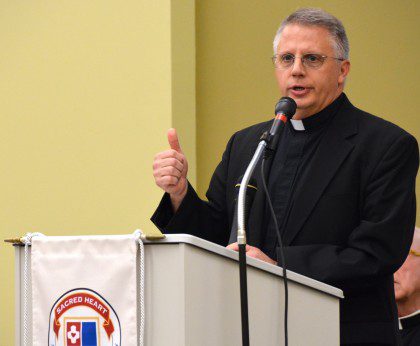
Interestingly, the very first expectation Pope Francis has of us religious is joy. Pope Francis says the world needs joyful people. He says: “We are called to know and show that God is able to fill our hearts to the brim with happiness….” There are all kinds of messages that we see on television that tell us about things we need to be happy. Our Holy Father is asking religious to let their lives and the ministry they are involved in witness to the fact that God is enough and that being in union with God is the only way we find true fulfillment and happiness.
He asks us to live up to the old saying that: “Where there are religious, there is joy.”
Another one of those expectations is that Pope Francis is “counting on (us religious) ‘to wake up the world’ since the distinctive sign of consecrated life is prophecy.” Prophets are not persons who magically predict the future. Prophets are persons called to speak for God to God’s People. They see reality for what it is and name it and call to conversion. What that speaks to for me is the fact that we instinctively know the truth when we hear it and we are drawn to it even though we do not like it. People are made for what is good and true and beautiful and the prophet names what is contrary to that in our lives and draws us to conversion.
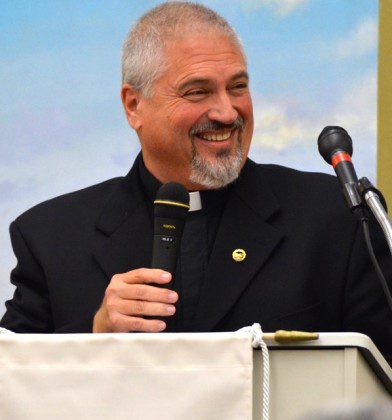
Pope Francis goes on to say: “Prophets tend to be on the side of the poor and the powerless, for they know that God … is on their side.” The prophet is the voice for those who have no voice or who are not heard when they do cry out. He also calls us religious to be “the leaven for a society inspired by the Gospel.”
I like to reflect on that image of being leaven when I get anxious about the smaller number of men and women in religious communities. By its very nature leaven is not something big. It is always something small, but it is powerful and is able to have an effect on the larger mass that surrounds it.
Another expectation that Pope Francis has for us religious is that we be “experts in communion.”
The message of community is so important for people to hear, especially now because of what is going on in our world. Fear and ignorance are driving us apart. Just consider our struggles with racism among and within us. The news media is filled with the struggles and suffering of people as they try to migrate to safety. Advances in technology have made us aware that our world is truly a global village. We are all connected and we need to learn to live together.
As religious we experience the internationality of our own communities. We struggle with the wonders and the woes of living in community with people who are different from us. That is where we are learning to be the “experts in communion” that Pope Francis says we are called to be. Religious clergy bring what they have learned in their everyday lives to the people they serve in ministry. We need to model and witness to community. If those we serve do not see it in our lives, our words calling them to live together lovingly will mean nothing.
The last expectation of Pope Francis that I want to refer to is his call “to come out of (ourselves) and go forth to the existential peripheries….” He says: “Don’t be closed in on yourselves, don’t be stifled by petty squabbles…a hostage to your own problems. You will find life by giving life, hope by giving hope, love by giving love.”
“We are all in this together. St. Paul talks about gifts that differ but all of which contribute to the building up of the Body of Christ, the Church, the People of God. So whether we are among the diocesan clergy or members of a religious community or members of the laity, we each need to know and celebrate and share the gift that the God has made us to be and to give.”
-Fr. John Czyzynski, SCJ
A shared mission
I was asked to reflect on the ministry of diocesan priests and that of clergy who are religious. As I re-read what I prepared I realized that I was trying to point out what characterizes the ministry of each group. I feel the need to emphasize that while there are elements that make the ministry of each group different and unique, they are not separate.
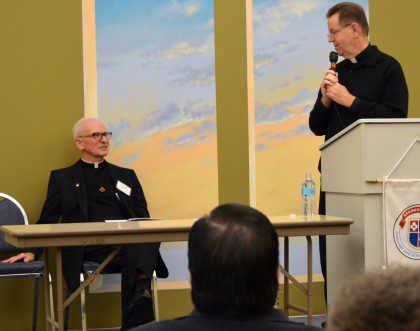
We are all in this together. St. Paul talks about gifts that differ but all of which contribute to the building up of the Body of Christ, the Church, the People of God. So whether we are among the diocesan clergy or members of a religious community or members of the laity, we each need to know and celebrate and share the gift that the God has made us to be and to give.
After the second Vatican Council there were all kinds of studies done on the priesthood from various points of view. The people who handled the psychological aspect of the study summed up the conclusion of all their work and investigation in a simple powerful sentence. They said: “Priests are ordinary men from whom the extraordinary is expected, especially by themselves.”
You know that people and we are ourselves can expect so much of ourselves. Many of those expectations are unreal, but what God’s people have a right to expect of us who are called to serve as ordained ministers is that we live as “men of God for others.”
My brothers, get to know the Shepherd, and share the One you have come to know and love with God’s People.
God bless you.

